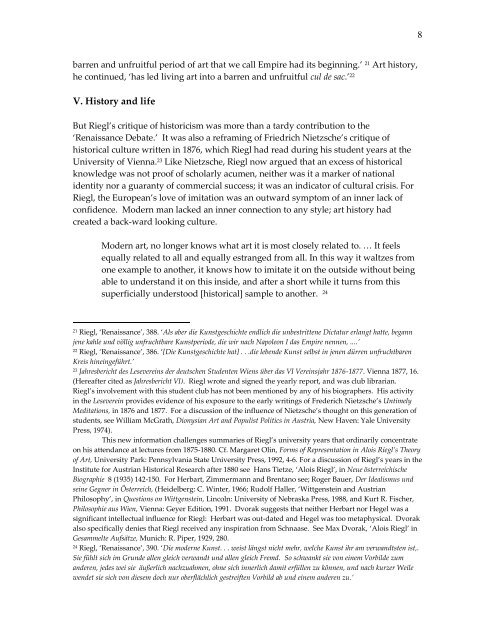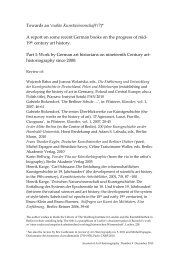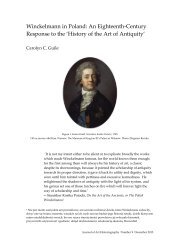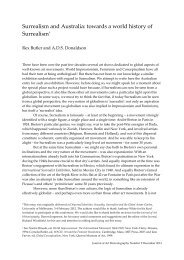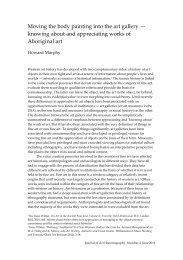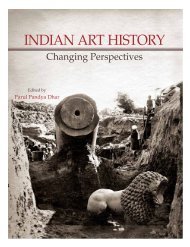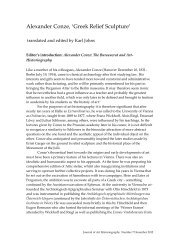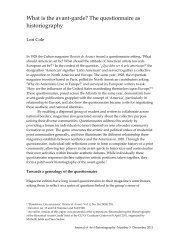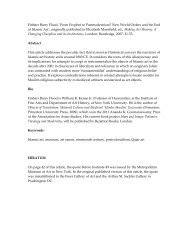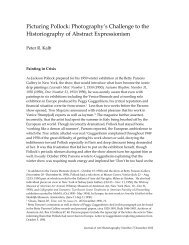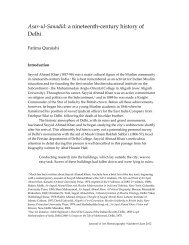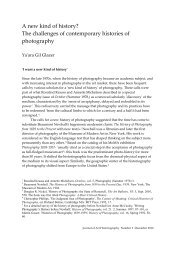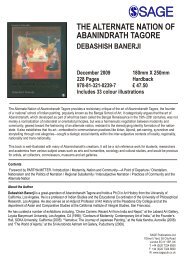The advantages and disadvantages of Art History to Life: Alois Riegl ...
The advantages and disadvantages of Art History to Life: Alois Riegl ...
The advantages and disadvantages of Art History to Life: Alois Riegl ...
You also want an ePaper? Increase the reach of your titles
YUMPU automatically turns print PDFs into web optimized ePapers that Google loves.
arren <strong>and</strong> unfruitful period <strong>of</strong> art that we call Empire had its beginning.’ 21 <strong>Art</strong> his<strong>to</strong>ry,<br />
he continued, ‘has led living art in<strong>to</strong> a barren <strong>and</strong> unfruitful cul de sac.’ 22<br />
V. <strong>His<strong>to</strong>ry</strong> <strong>and</strong> life<br />
But <strong>Riegl</strong>’s critique <strong>of</strong> his<strong>to</strong>ricism was more than a tardy contribution <strong>to</strong> the<br />
‘Renaissance Debate.’ It was also a reframing <strong>of</strong> Friedrich Nietzsche’s critique <strong>of</strong><br />
his<strong>to</strong>rical culture written in 1876, which <strong>Riegl</strong> had read during his student years at the<br />
University <strong>of</strong> Vienna. 23 Like Nietzsche, <strong>Riegl</strong> now argued that an excess <strong>of</strong> his<strong>to</strong>rical<br />
knowledge was not pro<strong>of</strong> <strong>of</strong> scholarly acumen, neither was it a marker <strong>of</strong> national<br />
identity nor a guaranty <strong>of</strong> commercial success; it was an indica<strong>to</strong>r <strong>of</strong> cultural crisis. For<br />
<strong>Riegl</strong>, the European’s love <strong>of</strong> imitation was an outward symp<strong>to</strong>m <strong>of</strong> an inner lack <strong>of</strong><br />
confidence. Modern man lacked an inner connection <strong>to</strong> any style; art his<strong>to</strong>ry had<br />
created a back-ward looking culture.<br />
Modern art, no longer knows what art it is most closely related <strong>to</strong>. … It feels<br />
equally related <strong>to</strong> all <strong>and</strong> equally estranged from all. In this way it waltzes from<br />
one example <strong>to</strong> another, it knows how <strong>to</strong> imitate it on the outside without being<br />
able <strong>to</strong> underst<strong>and</strong> it on this inside, <strong>and</strong> after a short while it turns from this<br />
superficially unders<strong>to</strong>od [his<strong>to</strong>rical] sample <strong>to</strong> another. 24<br />
21 <strong>Riegl</strong>, ‘Renaissance’, 388. ‘Als aber die Kunstgeschichte endlich die unbestrittene Dictatur erlangt hatte, begann<br />
jene kahle und völlig unfruchtbare Kunstperiode, die wir nach Napoleon I das Empire nennen, ....’<br />
22 <strong>Riegl</strong>, ‘Renaissance’, 386. ‘[Die Kunstgeschichte hat] . . .die lebende Kunst selbst in jenen dürren unfruchtbaren<br />
Kreis hineingeführt.’<br />
23 Jahresbericht des Lesevereins der deutschen Studenten Wiens über das VI Vereinsjahr 1876-1877. Vienna 1877, 16.<br />
(Hereafter cited as Jahresbericht VI). <strong>Riegl</strong> wrote <strong>and</strong> signed the yearly report, <strong>and</strong> was club librarian.<br />
<strong>Riegl</strong>’s involvement with this student club has not been mentioned by any <strong>of</strong> his biographers. His activity<br />
in the Leseverein provides evidence <strong>of</strong> his exposure <strong>to</strong> the early writings <strong>of</strong> Frederich Nietzsche’s Untimely<br />
Meditations, in 1876 <strong>and</strong> 1877. For a discussion <strong>of</strong> the influence <strong>of</strong> Nietzsche’s thought on this generation <strong>of</strong><br />
students, see William McGrath, Dionysian <strong>Art</strong> <strong>and</strong> Populist Politics in Austria, New Haven: Yale University<br />
Press, 1974).<br />
This new information challenges summaries <strong>of</strong> <strong>Riegl</strong>’s university years that ordinarily concentrate<br />
on his attendance at lectures from 1875-1880. Cf. Margaret Olin, Forms <strong>of</strong> Representation in <strong>Alois</strong> <strong>Riegl</strong>’s <strong>The</strong>ory<br />
<strong>of</strong> <strong>Art</strong>, University Park: Pennsylvania State University Press, 1992, 4-6. For a discussion <strong>of</strong> <strong>Riegl</strong>’s years in the<br />
Institute for Austrian His<strong>to</strong>rical Research after 1880 see Hans Tietze, ‘<strong>Alois</strong> <strong>Riegl</strong>’, in Neue österreichische<br />
Biographie 8 (1935) 142-150. For Herbart, Zimmermann <strong>and</strong> Brentano see; Roger Bauer, Der Idealismus und<br />
seine Gegner in Österreich, (Heidelberg: C. Winter, 1966; Rudolf Haller, ‘Wittgenstein <strong>and</strong> Austrian<br />
Philosophy’, in Questions on Wittgenstein, Lincoln: University <strong>of</strong> Nebraska Press, 1988, <strong>and</strong> Kurt R. Fischer,<br />
Philosophie aus Wien, Vienna: Geyer Edition, 1991. Dvorak suggests that neither Herbart nor Hegel was a<br />
significant intellectual influence for <strong>Riegl</strong>: Herbart was out-dated <strong>and</strong> Hegel was <strong>to</strong>o metaphysical. Dvorak<br />
also specifically denies that <strong>Riegl</strong> received any inspiration from Schnaase. See Max Dvorak, ‘<strong>Alois</strong> <strong>Riegl</strong>’ in<br />
Gesammelte Aufsätze, Munich: R. Piper, 1929, 280.<br />
24 <strong>Riegl</strong>, ‘Renaissance’, 390. ‘Die moderne Kunst. . . weist längst nicht mehr, welche Kunst ihr am verw<strong>and</strong>tsten ist,.<br />
Sie fühlt sich im Grunde allen gleich verw<strong>and</strong>t und allen gleich Fremd. So schwankt sie von einem Vorbilde zum<br />
<strong>and</strong>eren, jedes wei sie äußerlich nachzuahmen, ohne sich innerlich damit erfüllen zu können, und nach kurzer Weile<br />
wendet sie sich von diesem doch nur oberflächlich gestreiften Vorbild ab und einem <strong>and</strong>eren zu.’<br />
8


